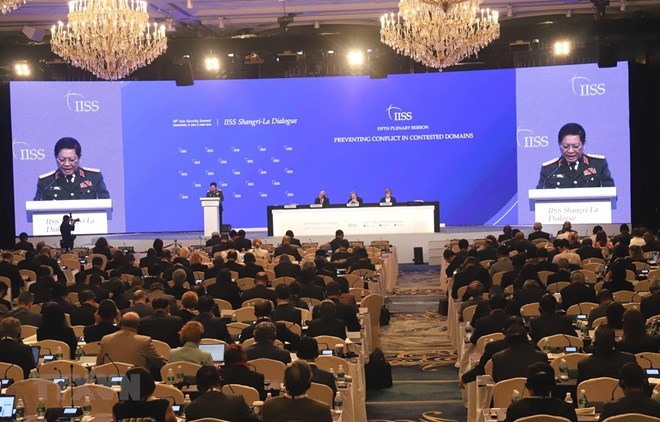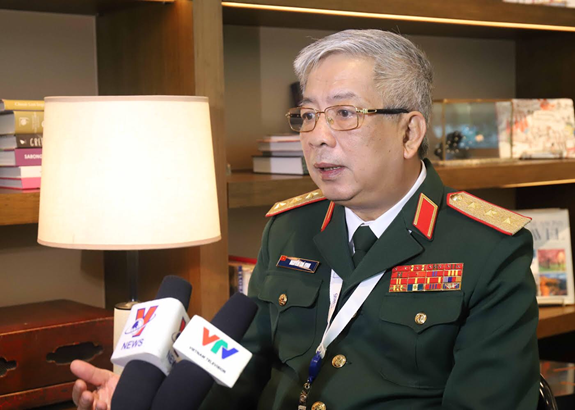 |
| Defence Minister Ngo Xuan Lich calls on parties concerned to work together to solve disputes in peaceful atmosphere. |
While addressing the fifth plenary session of the 18th Shangri-La Dialogue in Singapore on June 2, he stressed that the behaviour and actions of powers play an important role in this regard, saying they should take greater responsibility and set examples in international relations.
The minister made the suggestions given security challenges and complex issues facing the region, including strategic competitions between countries, especially powers.
The competition for strategic interests in Asia-Pacific is getting fiercer as the region has become more attractive thanks to its strategic and geographical location, he added.
The competitions are taking place at both regional and global levels, and in various spheres, from politics and diplomacy to economy, trade, natural resources, environment and national territorial sovereignty, regarding both traditional and non-traditional challenges, Lich said.
The minister emphasised that conflicts would lead to unexpected consequences and affect not only concerned countries but also the entire region and the world.
He highlighted Vietnam’s efforts in integrating into the world, enhancing relations with other countries and protecting peace, stability and security in the region and the world at large.
Regarding the East Sea issue, Lich appealed to concerned nations to abide by international law and show their responsibility and goodwill to build the East Sea into an area of peace, cooperation and development.
He lauded progress made in negotiations of the Code of Conduct in the East Sea (COC), saying the early formation of a pragmatic, binding and effective COC would significantly contribute to maintaining peace, stability, freedom, security and safety of navigation and overflight in the East Sea.
Vietnam hopes that the concerned parties will enhance dialogues and consultations, and work together to manage risks and prevent conflicts.
The country has joined hands with China and other relevant sides to promote the settlement of disputes in the East Sea by peaceful measures in accordance with international law, Lich said.
He told other delegates that regional cooperative mechanisms led by the Association of Southeast Asian Nations (ASEAN) like the ASEAN Regional Forum, the East Asia Summit, the ASEAN Defence Ministers’ Meeting (ADMM), the ASEAN Maritime Forum, and the ADMM-Plus, along with such mechanisms as the Shangri-La Dialogue, the Beijing Xiangshan Forum and the Moscow Conference on International Security, have significantly contributed to controlling uncertainties and competitions, and preventing conflicts.
Shangri-La Dialogue: Interest of participants has become more practical
A special point of the ongoing 18th Shangri-La Dialogue in Singapore is that the interest of the participating countries has become more practical, which raises the voice of small countries clearer.
 |
| Deputy Defence Minister, Sen. Lt. Gen. Nguyen Chi Vinh (Source: qdnd.vn) |
In an interview granted to the Vietnam News Agency, Deputy Defence Minister, Sen. Lt. Gen. Nguyen Chi Vinh also held that small countries now participate in the dialogue with an equal footing and voice compared to major powers, describing this as a new and progressive point in this forum.
He further pointed out that the number of participants and contents of the dialogue is very large, and this manifests two aspects, namely more and more countries are interested in security in Asia-Pacific and security in the region is of great interest but many issues are emerging here.
According to the official, the focus of attention of participating countries now is the relations among the large powers, how to solve the many disputes surfacing in the region, and the need for trans-national cooperation to solve the new security issues.
Regarding the speech by host Prime Minister Lee Hsien Loong which stresses the role of small countries in multilateral mechanisms as well as affirms the central role of ASEAN in the regional security structure, Deputy Minister Vinh stressed that the centrality of the ASEAN in multilateral cooperation in the region is the decisive factor of the future of stability and development of Asia-the Pacific in general and Southeast Asia in particular.
However, this is also a challenge now, as there is a question whether that centrality exists. It stems from the question whether ASEAN has a common voice and solidarity in face of the regional major issue.
Vinh also described Lee’s speech as very significant as it touched upon a long period in which the region has experienced many ups and downs on the way to peace and stability but not sustainable like today.
Cooperation key to solving disputes in seas: Shangri-La dialogue
The 18th Shangri-La Dialogue in Singapore on June 1 saw various discussions under themes related to maritime security, national defence industry development and national defence cooperation.
Participants stressed that cooperation and dialogue are key to solving disputes in the seas in general and in the East Sea in particular. They shared the view that the competition among powers has intensified tension in the East Sea and resulted in increasing risks of conflicts in the sea and in the air which may lead to major hostilities that may negatively impact ASEAN countries.
The East Sea must be a region of peace and friendship rather than confrontation and hostilities, they stressed.
Speaking at the discussion on maritime security, Director of the Institute of National Defence Strategies Dang Quang Minh said that maritime security must be based on the spirit of respect to laws and legitimate sovereignty of claimants. Besides, it also needs to respect the interests of the countries, and no seas belong to any single country or groups of countries.
The presentation by Vietnam also highlighted the message of the need to create an atmosphere of peace in solving disputes, that is why the forum is a chance for the countries to conduct dialogue, create an atmosphere of peace on the basis of responsibility to the community so as to settle disputes on the sea in general and on the East Sea in particular.
Many experts held that the negotiations of the Code of Conducts (COC) in the East Sea between ASEAN and China are proceeding in a favourable way, but they should be practical and it is important not to run against provisions of the international law. The two sides should clarify conceptions on the rights to access and freedom and security of navigation in the East Sea.
VNA
 Vietnamese Defence Minister Ngo Xuan Lich called on parties concerned to work together to solve disputes in peaceful atmosphere, with partnership spirit and for community responsibility.
Vietnamese Defence Minister Ngo Xuan Lich called on parties concerned to work together to solve disputes in peaceful atmosphere, with partnership spirit and for community responsibility.